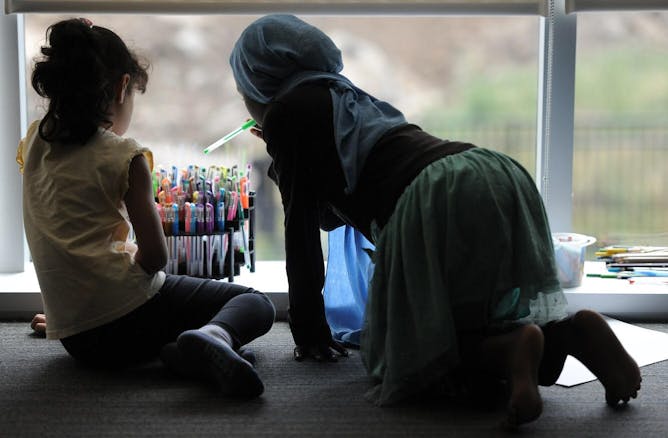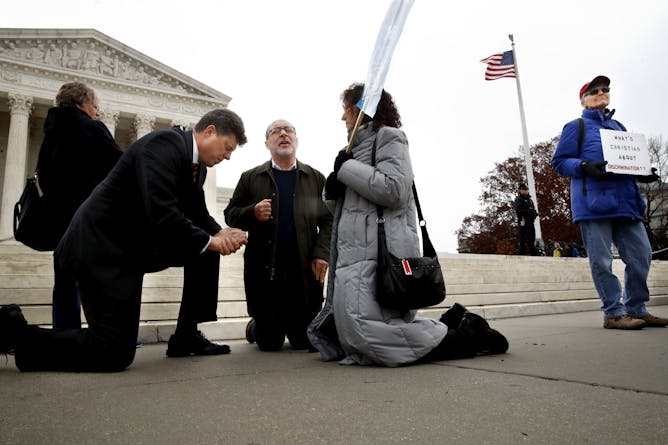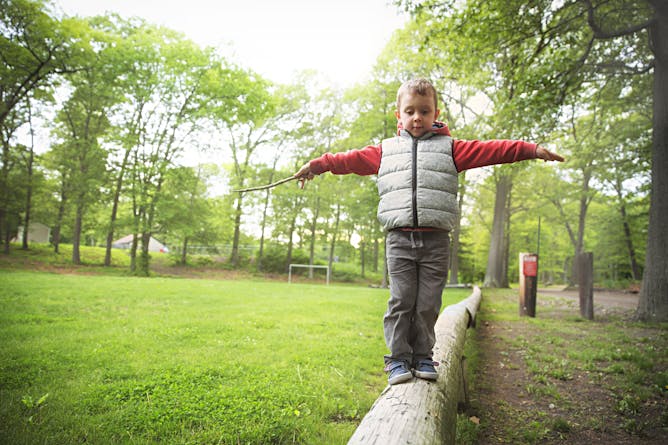|
|
|
Editor's note
|
|
Syrians once lived in a relatively stable country, but that ended when civil war erupted there seven years ago. How have Syrian refugees managed to live with the chaos and trauma of having one’s world torn apart? Arash Javanbakht, a professor of psychiatry at Wayne State University, led a research team in Michigan to study the psychological effects and, through culturally familiar methods, address “the need for immediate attention to the mental health of this population.”
On Monday, the Supreme Court ruled in favor of a Colorado baker who refused to bake a wedding cake for a gay couple, citing religious reasons. The ruling, however, will not resolve the larger contentious issue of religious freedom, explains religion scholar David Mislin. While religious freedom may be considered an ideal component for harmony, history shows it has often led to conflict.
Utah recently adopted a “free-range parenting” law that permits parents to let young children do certain things on their own, such as go to the park, without the parents being criminally charged with neglect. Law professor David Pimentel questions whether the government should even weigh in when it comes to parenting styles.
|
Lynne Anderson
Health + Medicine Editor
|

|
|
Trending on site
|

Two refugee children play at Tolan Park, a research and treatment center in Detroit, the site of the author’s research.
David Dalton/Wayne State University
Arash Javanbakht, Wayne State University
In the seven years since civil war erupted in Syria, refugees have fled the violence and destruction. But starting over in a new country after such experiences is much harder than it may seem.
|

Pastors kneel in prayer in front of the Supreme Court, as a counter-protester holds a sign that says “What’s Christian About Discrimination.”
AP Photo/Jacquelyn Martin
David Mislin, Temple University
Arguments on religious freedom have taken place throughout US history and have landed in the Supreme Court as well. Interpretations have changed over time.
|

Americans differ over when children can be left unattended.
EvgeniiAnd/www.shutterstock.com
David Pimentel, University of Idaho
Utah's new 'free-range' parenting law restores certain rights to parents regarding when they can leave their children unattended. But does the law go too far or not far enough?
|
Politics + Society
|
-
Ross Baker, Rutgers University
Robert F. Kennedy, assassinated 50 years ago, began his career as a conservative anti-communist. At the end of his life, he was transformed into a liberal who championed civil and workers' rights.
-
Juliet S. Sorensen, Northwestern University; Elise Meyer, Northwestern University
Corruption has made hurricane Caribbean countries' recovery less efficient and more expensive, new research shows. Misuse of funds may also trigger more disaster-related deaths.
|
|
Science + Technology
|
-
David R. Johnson, University of Nevada, Reno
Money always seems tight university scientists. A sociologist conducted hundreds of interviews to see how they think about funding sources and profit motives for basic and applied research.
-
Peter Schumer, Middlebury College
Linguistic clues show how people around the world first developed mathematical thought.
|
|
|
|
|
|
|
|
From our international editions
|
-
Julie Snorek, Autonomous University of Barcelona
The Environmental Justice Atlas highlights the most pertinent findings of environmental conflicts facing the world today.
-
Carin Holroyd, University of Saskatchewan; Ken S. Coates, University of Saskatchewan
The decision of the Canadian government to purchase the $4.5 billion Kinder Morgan pipeline expansion project doesn't exactly instil confidence in Canada's investment climate.
-
Darren Saunders, UNSW
Headlines that 70% of women with breast cancer don't need chemo need to be heeded with caution: it's a very specific (but substantial) subtype that was studied.
|
|
|
|
| |
| |
|
|
|
|
|
|
|